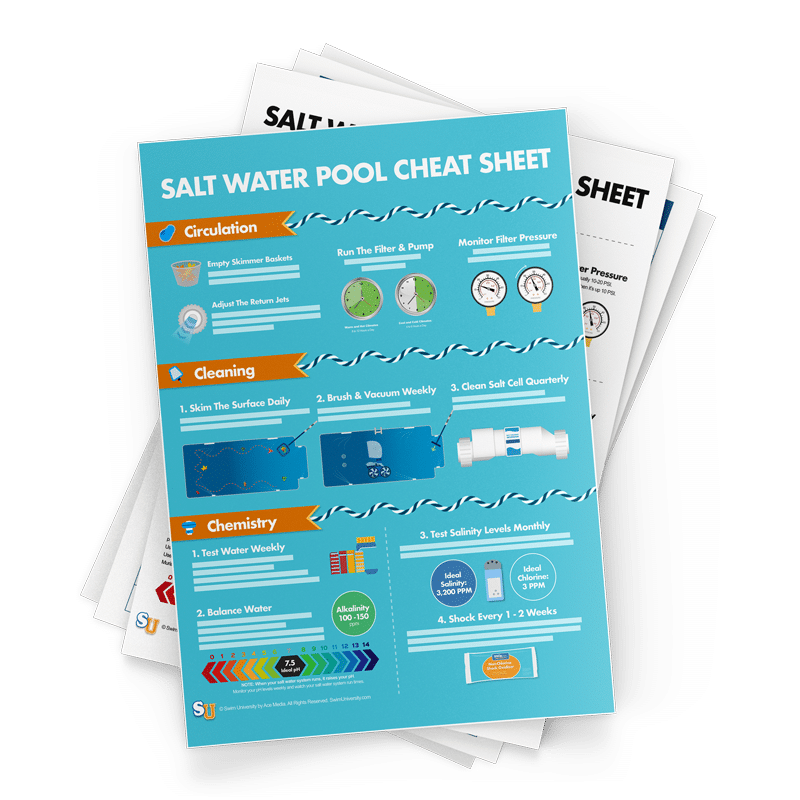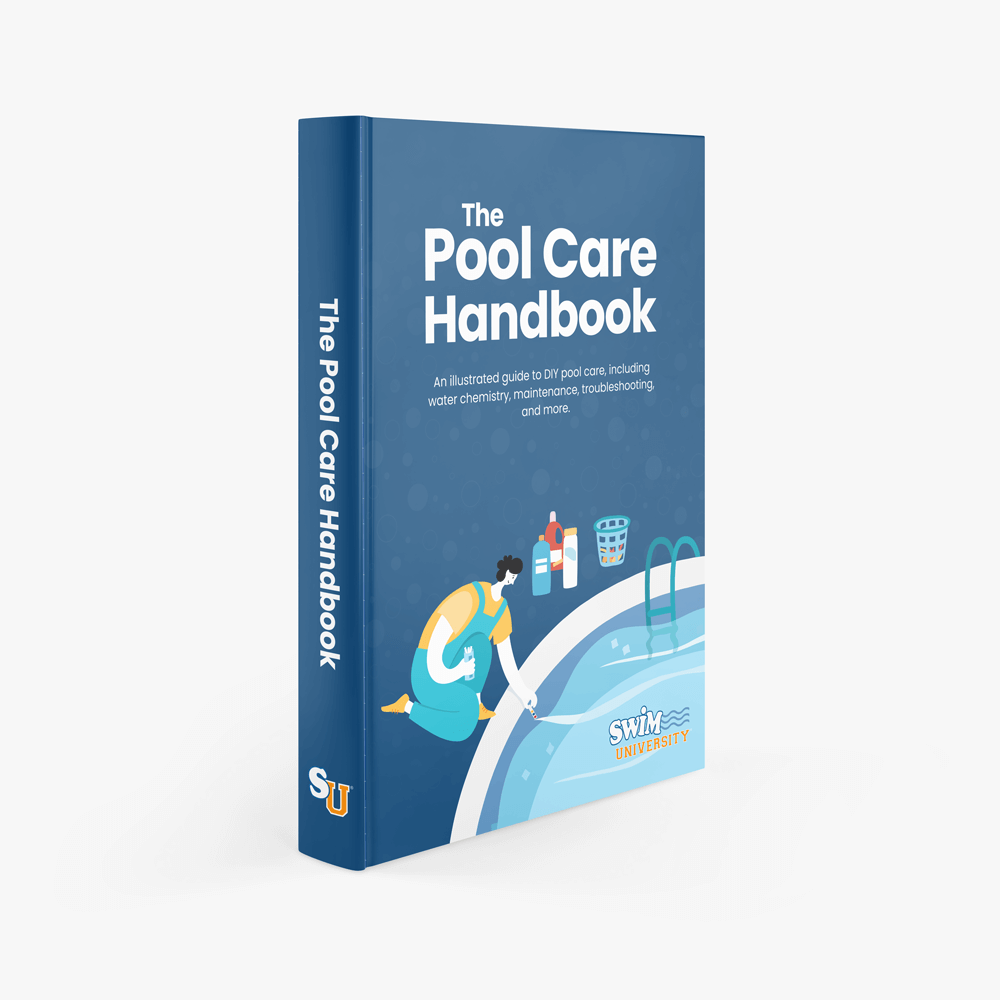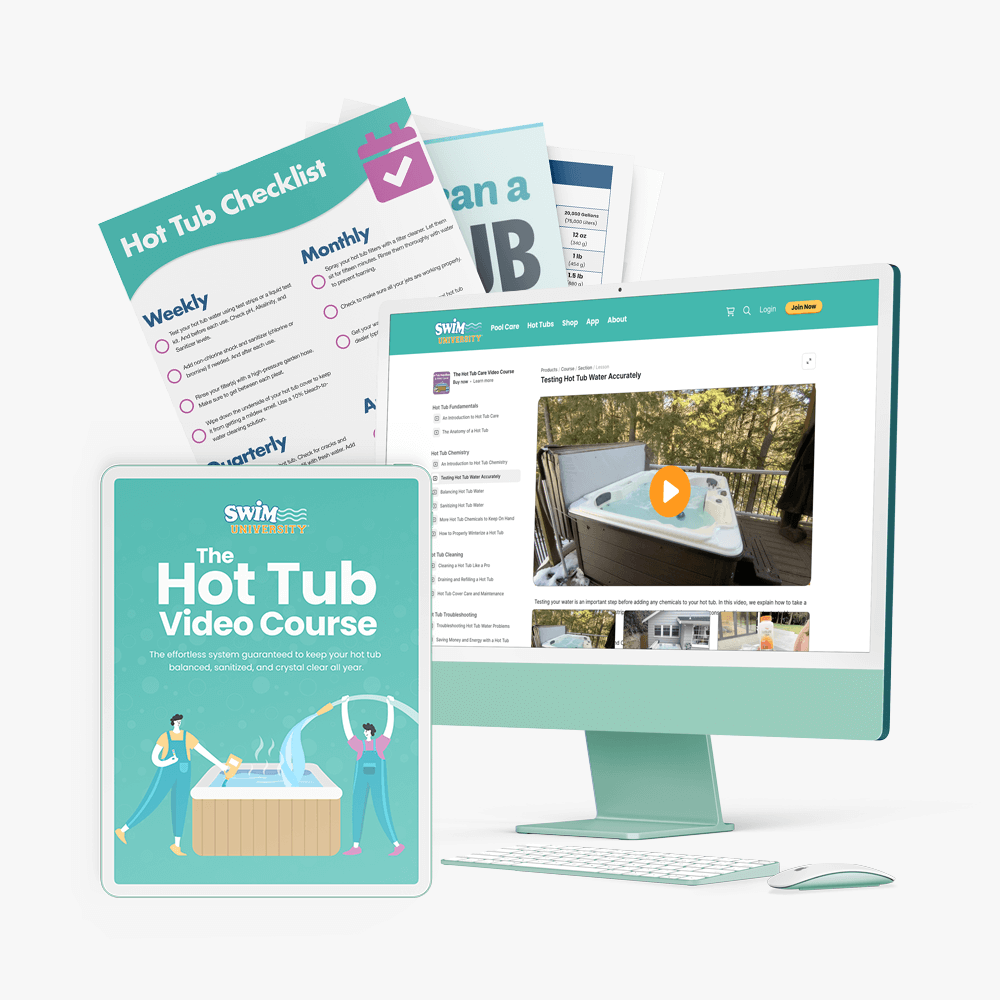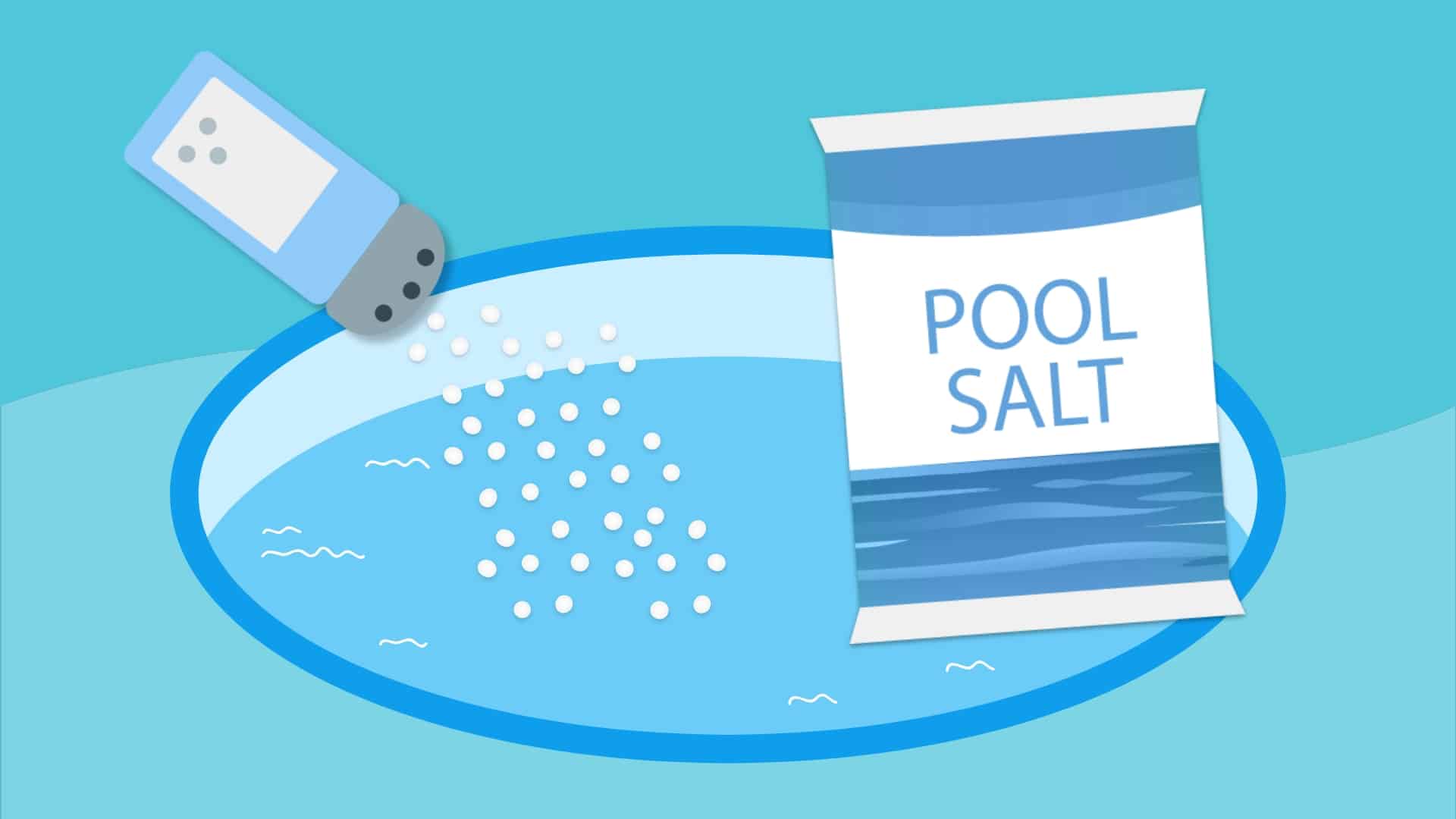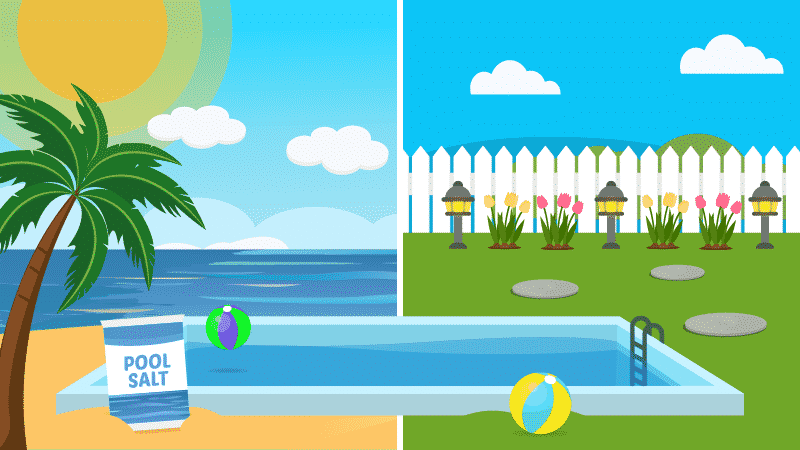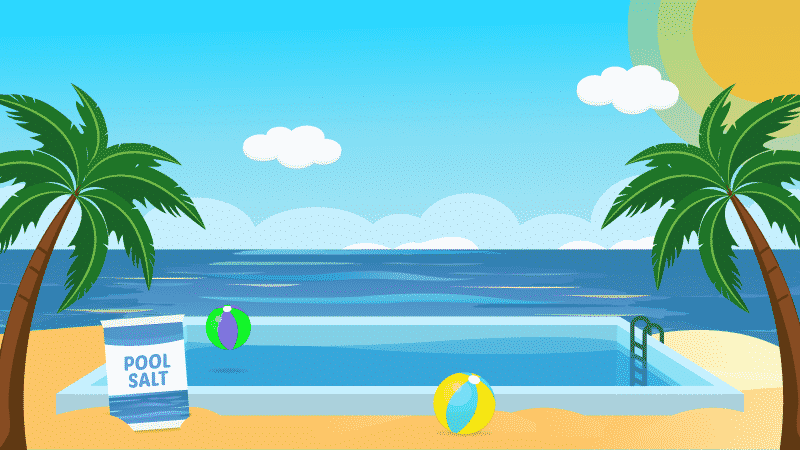Salt Water Pools: How Do They Work and Are They Worth It?
Salt water pools are a great alternative to traditional chlorine pools — especially for swimmers with sensitive eyes and skin. With only 1/10 the salt of ocean water, you can’t actually notice any salt in the water. And you’ll only need to add salt once or twice a year to keep your pool sanitized.
But salt water systems have a few downsides. They’re expensive to buy and more complicated to maintain. And you’re still technically swimming in water that has chlorine.
So before you invest in a salt water system, here are the pros and cons of owning a salt water pool. This includes overall costs and savings, specific maintenance needs, and which salt water system to buy. Watch the video below or keep reading for the complete guide.
Stop wasting time and money with confusing water chemistry and maintenance. Our effortless system guarantees to keep your pool balanced, sanitized, and crystal clear all year. Works for all pools including saltwater.
How Does a Salt Water Pool Work?
A salt water pool uses a salt water generator, also known as a salt water chlorine generator, to sanitize your water.
This salt water generator (or salt water chlorinator) has a high/low salt and temperature indicators to help protect your equipment. And the self-cleaning salt cell makes regular maintenance easy. Check out their models for both inground and above ground pools.
Through a process called electrolysis, the salt water generator converts any salt that’s added to your water into chlorine. That’s right: a salt water pool is still a chlorine pool. But instead of buying and adding chlorine directly to your water, you’re adding pool-grade salt which gets converted into chlorine.
Professional Pool Salt crystallizes early to match the fastest dissolve rates on the market - no more waiting for hours for chlorine tablets to dissolve and produce beautiful clean water.
Unlike other pool chemicals, salt does not evaporate from the pool water so you’ll only need to add salt to your pool once or twice a year. The salt water generator actually recycles the salt as it runs, so it can keep using the same salt to produce chlorine. Again, this is not a chlorine-free alternative to a traditional chlorine pool. It’s just a different process of making chlorine.
Salt water systems also monitor their chlorine output, preventing fluctuations in your chlorine levels and keeping your water consistently sanitized. This helps prevent bacteria growth, algae blooms, and chloramines (the smelly byproduct of used-up chlorine). Once you add salt to the water and start running the salt water generator, the chlorine levels will stay consistent.
How Much Salt Does a Salt Water Pool Need?
Your pool’s salt levels need to be around 3,200 PPM (parts per million) before the salt water generator can start producing chlorine. That’s less than the amount of salt in human tears and about 1/10 the amount of salt in ocean water.
To get the right amount of salt in your pool water, you’ll add pool-grade salt, which usually comes in 40-pound bags. If you have a 10,000-gallon pool, for example, you’ll need 6 or 7 bags to raise your salt levels from 0 PPM to 3,200 PPM.
Benefits of a Salt Water Pool
If you want a gentler swimming experience while avoiding handling chlorine, a salt water system is a great investment. Here are a few reasons why they’re worth the upfront cost of installation:
1. No Need to Buy and Add Chlorine
Handling pool-grade salt is a lot safer than handling chlorine pucks or granules. And pool salt is cheaper and easier to purchase than chemicals like chlorine. Plus, you usually only need to add salt to your water at the beginning of the pool season or if your water becomes diluted (like after a rain storm). A salt water pool is worth it just to never have to handle chlorine again!
2. Chlorine Levels Stay Stable
Because the salt water generator monitors and releases a slow, steady output of chlorine, your water’s chlorine levels stay consistent. And that means salt water pools tend to avoid problems like algae and cloudy water. Stable chlorine levels also mean fewer chloramines. That’s the byproduct of used-up chlorine that causes that nasty, chlorine-like smell in pools.
3. Gentler on Skin and Eyes
Salt water pools have a smoother, silkier feel to the water than regular pools. And because there are no spikes in chlorine levels, they’re a much gentler alternative for sensitive swimmers who are normally irritated by traditional chlorine pools.
Problems with Salt Water Pools
While there are some clear benefits of owning a salt water system, there are more upfront costs and ongoing equipment maintenance. And there is a risk of it eroding parts of your pool. Here are a few drawbacks to salt water systems, including the price tag and maintenance needs:
1. Expensive Initial Investment
It can cost several thousand dollars to convert a chlorine pool to a salt water system. That includes purchasing the salt water generator and the labor to install it. So while you may save money by not buying chlorine, you’ll be spending a lot more on the initial conversion over to salt system.
2. Complicated and Expensive Maintenance
Any new piece of equipment that’s added to your pool system requires maintenance and upkeep, and a salt water generator is no different. The salt cell inside the system must be cleaned every few months and replaced every three to seven years. And because it’s an electronic system, you’ll likely need to hire a professional for major repairs or maintenance. Finally, while you won’t need to constantly buy chlorine tablets or granules, you will need to use more electricity to keep your salt water generator running.
3. Some Chemical Levels Can Fluctuate
While it’s easy to get excited about never having to manually add chlorine to your water again, you’ll still need to regularly test and balance your water chemistry. Your pH levels, for example, tend to rise as your salt water generator runs. And pH above 7.6 can lead to skin irritation, burning eyes, and calcium build-up or scaling on your pool equipment.
Be sure to check out our guide on Salt Water Pool Maintenance for more information on balancing salt water chemistry.
4. Won’t Work in Cold Temperatures
Salt water pool systems won’t produce chlorine if your water temperature is below 60 degrees Fahrenheit (15.5 degrees Celcius). So if you’re in a colder climate without a pool heater, your chlorine production will stop when your water temperature drops too low.
5. May Corrode Metal and Soft Stonework
While salt water isn’t harmful in average doses, it can start to break down equipment if it starts to build up. Automatic pool covers, pool liners, metal pool equipment, and even natural stonework or landscaping near the pool can start to erode with too much salt water exposure. So keep an eye out for exposed metal components, especially on vinyl pools. But fiberglass pools are generally more safe from salt water corrosion.
Are Salt Water Pools Worth It?
If you’re tired of constantly buying and adding chlorine and rebalancing your water chemistry, a salt water generator is a great investment. But while you’ll save money on chemicals, the initial investment and maintenance will cost more. Salt water generators usually cost $1,000 or more and you’ll have to replace your salt cell every three to seven years.
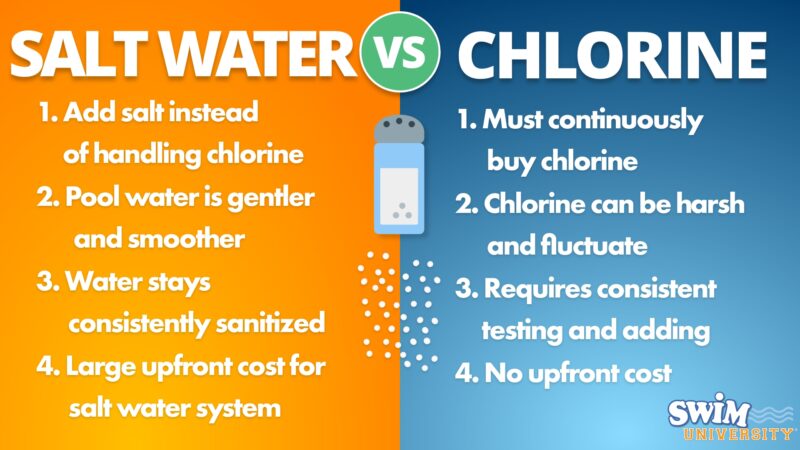
Overall, if you can afford the initial investment, the cost difference between a salt water pool vs. a chlorine pool evens out over time. Given the lifespan of a salt water generator and how often you’ll need to repair or replace parts, you’ll probably spend the same as you would maintaining a chlorine pool. But it’s worth it for a better swimming experience and never having to handle a chlorine tablet again.
Finally, remember that a salt water pool is still a chlorine pool, so you’re still swimming in chlorinated water. And while there’s less manual testing needed, you’ll want to make sure your salt water generator is accurately measuring your chlorine levels and that your other water chemistry levels (like pH) are still in range.
Best Salt Water Pool Systems
If you’re looking to buy a salt water system, we recommend the Hayward Salt Chlorination System. It gives you complete control over your chlorine output levels and has a very long lifespan (compared to other salt water systems). There are several sizes to choose from, allowing you to chlorinate up to 40,000 gallons of water:
This salt water generator (or salt water chlorinator) has a high/low salt and temperature indicators to help protect your equipment. And the self-cleaning salt cell makes regular maintenance easy. Check out their models for both inground and above ground pools.
Hayward is a historically reliable pool company known for manufacturing dependable pool equipment. They also make an above ground salt water system that chlorinates up to 18,000 gallons of water:
This easy-to-install salt water system will chlorinate pools up to 18,000 gallons. Its digital salt display, diagnostic indicators, and super-chlorinate feature make pool maintenance easy.
Both Hayward systems require some space in your plumbing for installation. So if you have limited room, check out the Pentair IntelliChlor for a more compact option.
This compact salt water system is easy to install and perfect for closely-packed pool plumbing setups. The easy-to-read display makes adjusting your salt and chlorine levels simple and intuitive.
Frequently Asked Questions about Salt Water Pools
Need more information about salt water systems? Here are some common questions and answers.
Do salt water pools taste salty?
No, salt water pools don’t really taste salty. Their salt levels are around 3,200 PPM. That’s 1/10 the amount of salt that’s in ocean water and about half the amount of salt that’s in human tears.
How much salt do I need to add to a salt water pool?
Your pool’s salt level should be between 2,700 and 3,400 PPM (parts per million). Usually 3,200 PPM is ideal, but always check with your salt water generator owner’s manual.
You’ll need to add enough pool-grade salt to the water, which is sold in 40-pound bags. For example, if you have a 20,000-gallon pool and your salt level is 0 PPM (no salt added yet), you’ll need about 14 bags of salt or 568 pounds. You usually only have to add salt to your water once or twice a year, since it doesn’t evaporate like other pool chemicals.
Here’s a cheat sheet to help you calculate how much salt to add:
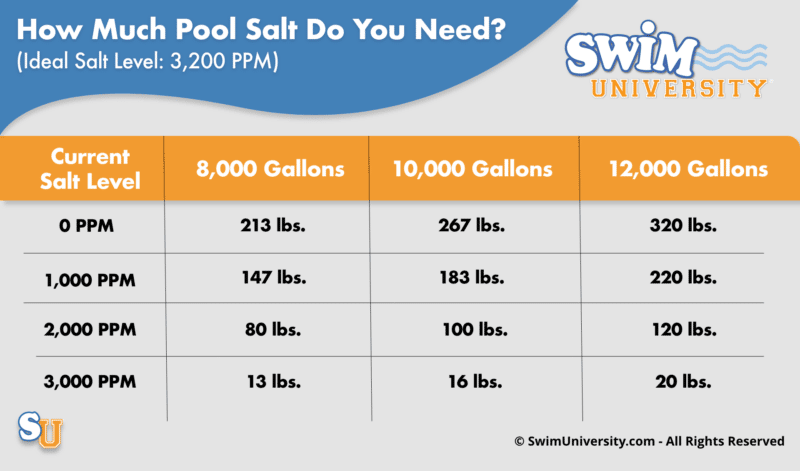
And if you need more help with these calculations, check out our guide on How Much Pool Salt to Add.
Be sure to add salt slowly and retest your salinity levels before adding more. It’s easier to add more salt later than it is to remove it.
Can salt water pools be heated?
Yes, you can use a heater to heat your salt water pool. Improper pH levels and calcium hardness levels cause damage to heaters, not the salt water itself. So well-balanced water chemistry should not damage your pool equipment. However, salt water can erode soft stonework and exposed metal on ladders or automatic pool covers.
Do salt water pools turn your hair green?
Unbalanced pH levels can cause your hair to turn green, not salt water itself. So regardless of whether you have a salt water pool or a traditional chlorine pool, always test and balance your chemistry levels.
Are salt water pools better than chlorine pools?
If you can afford the initial purchase and ongoing maintenance of a salt water generator, a salt water pool is a much more pleasant swimming experience. The water is softer and gentler than a traditional chlorine pool. And you’ll never have to buy or handle chlorine tablets or granules again.
4 Ways We Can Help With Your Pool
- Pool Care Cheat Sheets (Free): Easy-to-use downloadable guides to help you keep track of taking care of your pool this year.
- The Pool Care Handbook: An illustrated guide to DIY pool care, including water chemistry, maintenance, troubleshooting, and more.
- The Pool Care Video Course: You’ll get 30+ step-by-step videos and a downloadable guide with everything you need to know about pool maintenance.
- The Pool Care App: Enter your water test results. Get a custom treatment plan. Know exactly what chemicals to add to keep your pool clear.
